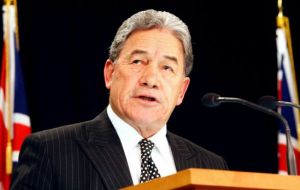MercoPress. South Atlantic News Agency
Sea Shepherd celebrates Japan will cease whaling around Antarctica
 Marine conservationists Sea Shepherd “delighted to see the end of whaling in the Southern Ocean Whale Sanctuary”, said captain Paul Watson in a statement.
Marine conservationists Sea Shepherd “delighted to see the end of whaling in the Southern Ocean Whale Sanctuary”, said captain Paul Watson in a statement.  Environment group Greenpeace and New Zealand Deputy Prime Minister Winston Peters both expressed disappointment in Japan's decision to leave the IWC
Environment group Greenpeace and New Zealand Deputy Prime Minister Winston Peters both expressed disappointment in Japan's decision to leave the IWC  Japan said it was leaving the IWC to resume whales commercial hunts for the first time in 30 years, “but would no longer go to the Antarctic for its annual killings”
Japan said it was leaving the IWC to resume whales commercial hunts for the first time in 30 years, “but would no longer go to the Antarctic for its annual killings” Marine conservationists Sea Shepherd are claiming Japan's decision to abandon whaling around Antarctica as a victory, though their battle will go on with the Asian nation moving to resume hunting elsewhere. On Boxing Day, Japan announced it was leaving the International Whaling Commission so it could resume commercial hunting of the marine mammals in their territorial waters.
Marine conservationists Sea Shepherd, who have clashed with whalers many times, were “delighted to see the end of whaling in the Southern Ocean Whale Sanctuary”, captain Paul Watson in a statement. “We look forward to continuing to oppose the three remaining pirate whaling nations of Norway, Japan and Iceland. Whaling as a 'legal' industry has ended.”
Environmental action group Greenpeace and New Zealand Deputy Prime Minister Winston Peters both expressed disappointment in Japan's decision to leave the IWC and commence commercial whaling in Japan's waters.
Japan announced that it is leaving the International Whaling Commission to resume commercial hunts for the animals for the first time in 30 years, but said it would no longer go to the Antarctic for its much-criticized annual killings.
Japan switched to what it calls research whaling after the IWC imposed a moratorium on commercial whaling in the 1980s, and now says stocks have recovered enough to resume commercial hunts.
Chief Cabinet Secretary Yoshihide Suga said Japan would resume commercial whaling in July “in line with Japan's basic policy of promoting sustainable use of aquatic living resources based on scientific evidence.”
He added that Japan is disappointed that the IWC - which he said is dominated by conservationists - focuses on the protection of whale stocks even though the commission has a treaty mandate for both whale conservation and the development of the whaling industry.
“Regrettably, we have reached a decision that it is impossible in the IWC to seek the coexistence of states with different views,” he said at a news conference.
Suga said the commercial hunts would be limited to Japan's territorial waters and its 323-kilometre exclusive economic zone along its coasts. He said Japan would stop its annual whaling expeditions to the Antarctic and northwest Pacific oceans. Non-signatory states are not allowed to do so, according to Japanese Fisheries Agency officials.
Japanese officials said Japan, even after leaving the whaling convention, will remain as an observer to the IWC and plans to continue participating in the group's scientific meetings and annual conferences.
The environmental group Greenpeace condemned the announcement and disputed Japan's view that whale stocks have recovered, and noted that ocean life is being threatened by pollution as well as overfishing.
“The declaration today is out of step with the international community, let alone the protection needed to safeguard the future of our oceans and these majestic creatures,” Sam Annesley, executive director of Greenpeace Japan, said in a statement. “The government of Japan must urgently act to conserve marine ecosystems, rather than resume commercial whaling.”
Australia's government, often a vocal critic of Japan's whaling policies, said in a statement that it was “extremely disappointed” with Japan's decision to quit the commission.




Top Comments
Disclaimer & comment rules-

-

-

Read all commentsProud of Sea Shepherd and Australia in making Japan finally realise that it's just not worth it to come down here to hunt whales.
Dec 28th, 2018 - 10:10 am +1Now they can stick to their own EEZ and hunt whales. Though considering they are spending over US$50 million per year so they can stockpile thousands of tonnes of whale meat that no one eats..... well me thinks that Sea Shepherd just made it way to expensive to continue.... money talks!
I will believe that the Japanese will stay outside Antarctic Waters for the 2019 season on the first of January 2020. Their claim is just so that they can give the Sea Shepherd and Australian Patrol Boats the slip and get down there to have an uninterrupted season in the rich hunting grounds down there.
Dec 28th, 2018 - 12:37 pm +1It was slightly entertaining watching on television the Sea Shepherd go up against the Japanese vessels with inventive harassment technics that the Japanese retaliated with high pressure water hoses. Now the Sea Shepherd “celebrates” as Japan changes where they will harvest their catches?
Dec 27th, 2018 - 01:21 pm 0The answer for everyone is vegan approved organic soya based surimi to stop the Japanese from consuming seafood I guess.
Commenting for this story is now closed.
If you have a Facebook account, become a fan and comment on our Facebook Page!